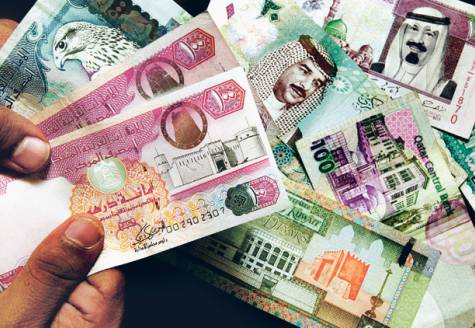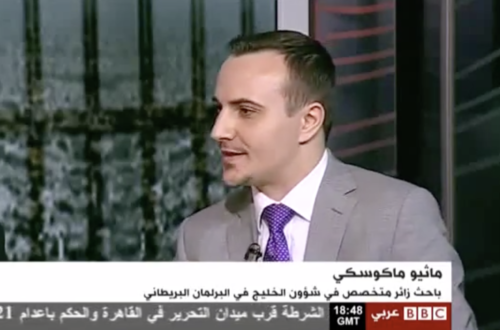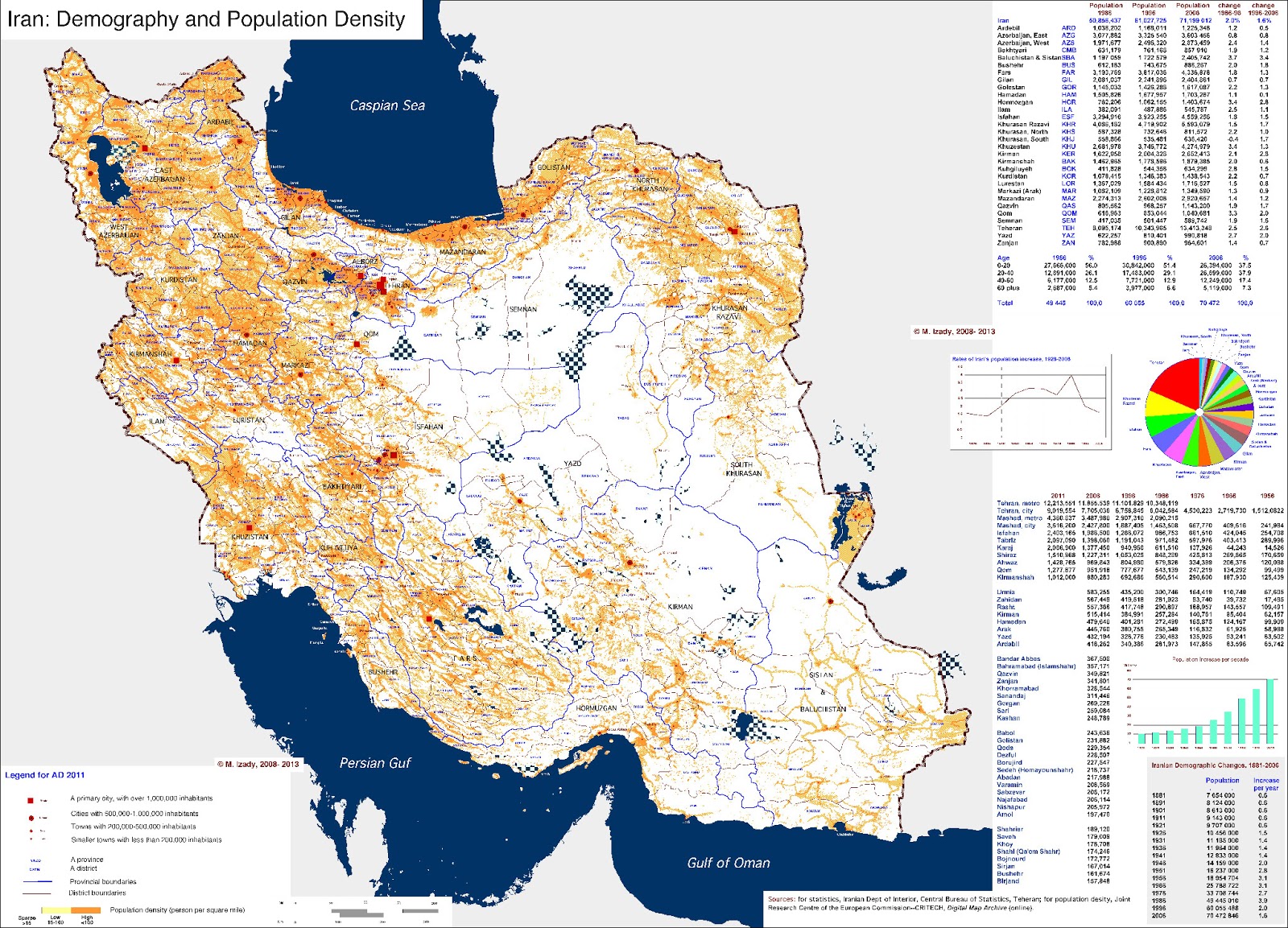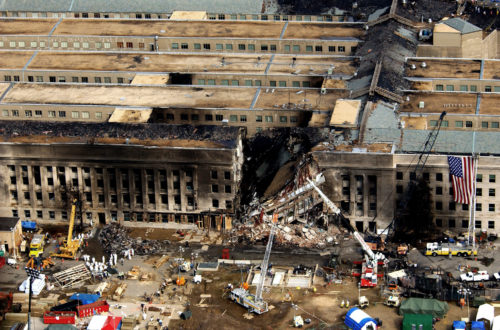The Persian Gulf; or as the khaleeji[1] Arabs sometimes prefer to call it – the Arabian Gulf; has recently proved to be one of the fastest developing areas in the world with enormous wealth and vast supplies of oil and gas.[2] The emergence of oil determined a virtual turning point in the history of the Arabian Peninsula. Previously tribal and poor lands of the Arabian Desert, which had never even drawn much interest of the colonial powers, suddenly became the major exporters of oil – the most wanted natural resource of the day. This advent of the oil era importantly changed the internal mechanism of the Gulf states, as the exogenous rent became the predominant source of national income.
This article endeavours to critically assess the analytical value of rentier state theory of Luciani and Beblawi, in relation to the resilience of Arab monarchies in the Gulf. It will contrast them with the experience of other oil states, such as Iran or Libya, eventually falling to revolutions. The main focus of this article is the notion of stability of the state system rather than the existence of Gulf monarchies as such. It is believed that the rentier state theory highly contributes to our understanding of relative political stability of the Arabian Gulf, however in my opinion it also significantly distorts our perceptions of the Arab state, by sometimes inaccurately assessing or even disregarding further equally crucial factors, i.e. the impact of religion and religious legitimisation of the ruling families, the well-established tribalism with typically local customs of succession by familial and tribal consensus, strong tradition of patronage, coercive state apparatus or considerable traditional allegiances. A plausible theory of stability of the state in the Arabian Gulf must necessarily include all these facets of political life.
The experience of significant regime instability of some rentier states in the region; such as Libya, Iraq or Iran; also indicates that there could be other factors, such as those described above that were originally underestimated by the rentier state theory. In my opinion, it is those aspects that make the Gulf monarchies the essentially sui generis states. This further demonstrates that, although rightly indicating the importance of oil wealth in creating a strong sense of a nation of ‘haves’ vs. ‘have nots’, with the citizenship being a truly financial asset, which largely helps to legitimise current regimes, the rentier state theory cannot be accepted as the finite explanation of the survival of absolutist monarchism in the Persian Gulf.
Citizenship – a financial asset
Although it is far too simplistic to blindly follow words of Kerr “that power grows (…) out of an ample state Treasury,”[3] the state’s wealth and strong financial position may certainly help to facilitate the process of stabilising the state. This is one of the key arguments of the rentier state theory. Rentierists believe that there is a strong positive correlation between the actual rent and the strength of the state’s system. The notion of ‘buying off’ the popular consent, which in turn grants the legitimacy of the regime, is central to their argument. Luciani indicates that, “Revenue from abroad dramatically improves the state’s ability to buy legitimacy through allocation and increases regime stability.”[4]

Wealthy rentier states, such as Qatar, Kuwait, Bahrain, Saudi Arabia or the UAE, inevitably end up transforming their systems into a typically allocative or distributative one, where the ruling elites allot their rent income to the citizens of the state. The notion of citizenship becomes a truly financial asset and helps creating a very clear distinction between the ‘have’ and ‘have not’ members of the society. Hazem Beblawi notes, “Citizenship is not only an effective relation between man and his homeland, it is also, or primarily, a pecuniary relation.”[5] Therefore, loyalty to the local ruling elite becomes widely accepted or at least preferred, as the “individuals find their personal economic interests vested directly in the state.”[6] Hirschman notes that ‘exiting’ the local or national community can be easily translated into very tangible financial losses and therefore, dissent is rare.[7] As a result of the claimed relative equation between the interest of the state and the interest of citizens, rentier state theorists argue that likelihood of rebellion and revolution strongly diminishes, as people would rather strive for their prosperity than engage in regime changes. Benjamin Smith claims, “(…) the ability of the state to placate important social groups by paying them off with oil revenues should allow regimes to survive long after they would otherwise be able to.”[8]
Similarly, distribution of oil revenues in the form of extensive welfare state is also being used as a regular policing tool. Denial of state benefits through deportations or deprivations of citizenship (as it was the case with a large number of Qataris that attempted to overthrow the current Emir Hamad Bin Khalifa Al Thani in 1996) is continuously used against those who oppose the ruling elite.[9] Although securing popular endorsement through efficient allocation of oil revenues may well demonstrate higher likelihood of maintaining state stability, it undoubtedly does not assure the absence of revolution or its probability, as may well be seen in the abovementioned case of Qatar.
Buying consensus – not just at home
A “Rentierist mentality” proposed by Beblawi also projects itself onto the international relations in the region. It is believed that the oil wealth is often used to secure regional peace and stability in pretty much the same way as it is the case domestically. Luciani believes that “their characteristic pattern of buying consensus at home”[10] is then naturally extended to the international realm through various foreign aid projects or foreign subsidies. Beblawi interestingly indicates this: “Very often Arab aid to fellow Arab states was used in much the same way as domestic redistribution of oil revenues: to buy allegiance or rather avoid trouble.”[11] Although this might be the usual case, the experience of Iraqi invasion of Kuwait and the Egyptian occupation of Yemen may indicate some faults of this theory. As Michael Herb rightly notes, “opportunism is a problem money cannot eliminate.”[12]
Moreover, the oil wealth is claimed to help unify the Gulf States and impede the secessionist tendencies. The case of the United Arab Emirates is claimed to be the best example of such a move. Luciani notes that regions with no or little oil resources within the UAE (Sharjah or Ras Al-Khaiman) happily accepted the federal arrangements proposed by their oil-rich neighbours.[13] The idea of having a share in the oil revenues of the wealthier emirates may have been quite quite appealing here and to a degree this project accounted for a stronger stability of the region. Similarly, according to Wilson: “Much less was heard of any desire in the Hejaz for separation or even regional autonomy, for example, as any split from Riyadh would deprive the region of oil revenue.”[14] These two cases may be quite exceptional, however it can be claimed that the oil wealth has some positive correlation to the stability of these two states and as Beblawi mentioned in his seminal chapter, ’the economic power’ bestowed upon the wealthy oil states allows seizing a considerable amount of ‘political power’ too.[15] Power that if “diverted in the right direction the dynasty might make the regime more stable.”[16]
 |
| Credits: Steve Bell |
Rentierism+
The existence of large oil revenues within a particular country may however, also have a very destabilising impact on the state. Smith and Okruhlik believe that a greed driven rebellion is significantly more likely in resource-rich countries.[17] Certainly, when a state fails to fulfil its social contract, a severe crisis of legitimacy is looming.[18] Moreover, if this failure in equal distribution of revenue of the state is connected with an increasing corruption of the ruling elite seeking personal advantages rather than common welfare, this situation may prove very prone to revolution. The existence of extensive oil revenues as such does not account to unlimited political stability, as we have experienced in Shah’s Iran.
The Iranian example leads to yet another very important stabilising factor that may account for relative resilience of the Arab monarchies of the Gulf. Smith argues, “the durability effect appears to have been independent of consistent access to rents with which regimes can buy legitimacy.”[19] Herb follows his argument and notices that “oil is important (…) but only as an intervening variable,”[20] which does not explain anything unless we understands its impact on political institutions. He then proposes that it is the fierce domination of the ruling families over the apparatus of the state, or what he calls the dynastic monarchism, that ensures durability of the political system in the Gulf. As the ruling families monopolise the highest state offices – with the prime ministers of all 6 Gulf states coming from the royal families[21] – and even turn to take over the high-profile positions in civil society,[22] the life of the entire state starts evolving around the ruling elite that becomes a large consortium of power.
The emergence of oil gave rise to vast bureaucratic state of the Gulf, and the state offices very quickly became the scene of intrafamily bargaining.[23] Extensive dominance of the ruling families over the state made it very difficult for any opposition parties to overthrow the current system[24]. Gause mentions also that control over disbursement of wealth gave the emir or king more control over the family and strengthened family discipline and political reliability.[25] This situation has only been reinforced by the prevailing tradition of endogamy. Herb mentions that “[i]n the oil age, the Al Khalifa have grown ever more exclusive and tightly knit”.[26] This can also be seen in the case of the house of Saud, where the inter- and intrafamily marriages were often used as a political tool to unify or stabilise the country.[27] The importance of the royal family seems to be absent in the rentier state theory and may prove a clear fault.
All in the family
The “robust mechanisms for the distribution of power among (…) members [of the royal family], particularly during successions,”[28] appears to be yet another factor attributing to durability of the system, which again has not been well addressed by the rentier state theory. Herb interestingly notices, “According to the prevailing theory of legitimate rule in Arabia (…) rulers take office only on receiving the bay’a (allegiance) of the leading men of the community.”[29] This remarkable indeterminacy of the succession rule is believed not to be of any threat to the state, but instead proves to be crucial to its resilience, as important intrafamilial alliances are made and family members appointed to state offices.[30] Herb believes that the example of Libya; with no dominance of the ruling elite over the state and no particular succession rule; that eventually fell to revolution is the best evidence for the remarkable resilience of the Gulf monarchies.[31] Reliability of this theory may well be questioned, however it appears to be a fact that no dynastic monarchy has yet been effectively overthrown or fallen to revolution.
 |
| Credits: Arabian Gazette |
Last but not least, the rentier state theory indicates the importance of coercive state apparatus built using the extensive state wealth and its correlation with the stability of the system. It is true that most Gulf monarchies have grown substantial armies and security structures. These agencies are often created with the sole purpose of decreasing the risk of regime failure through popular dissent or rebellion.[32] However, several examples of oil rentier states with impressive military strength eventually falling to revolutions, i.e. Iran, Libya, Iraq, may indicate that although armies may help stabilise the country, they do not guarantee the resilience of the system. The loyalty of the army cannot be easily bought, as we have seen in the case of Libyan Cyrenaican Defence Force, an organisation remarkably similar to the Kuwaiti or Saudi National Guards[33] or the Iraqi army before the revolution of 1958[34].
The theory of the rentier state significantly contributed to our understanding of contemporary politics of the Arabian Peninsula. Its reference to oil wealth, which completely reshaped the entire region, demonstrates new economic and socio-political aspects of the Arab monarchies. Nonetheless, it omits some crucial facets of domestic and regional politics, which clearly play a large role in explaining the stability of those states and the entire region. It is claimed here that this theory, though analytically helpful in explaining some factors attributing to the resilience of the state systems, does not provide final answers to the issue at question and may sometimes distort our perception, as it is sometimes used as a “catch-all phrase”[35]. Rathmell and Schulze rightly state that “it should be evident that no single model can explain political developments in the GCC states”[36].
MATTHEW MACHOWSKI © 2010
[1] Khaleej (خليجي ) is the widely used Arabic name for the Persian Gulf.
[2] However, the hereby discussed development is often claimed to be restricted to only some certain fields, i.e. the economy, the oil and gas industry, tourism, the law enforcement and the legislature, the infrastructure etc. There still exists a wide range of areas – such as social development, the human rights, the accountability of the governments, the health care and health promotion, etc. – where the Gulf States development proves to be slow
[3] Giacomo Luciani, “Allocation vs. Production States: A Theoretical Framework,” in The Arab State, ed. Giacomo Luciani, 65-84 (Berkeley: University of California Press, 1990): p. 79.
[4] ibid., p. 76
[5] Hazem Beblawi, “The Rentier State in the Arab World” in Giacomo Luciani, The Arab State, (Routledge: London, 1990): p. 88.
[6] F. Gregory Gause III, Oil Monarchies: Domestic and Security Challenges in the Arab Gulf States, (Council on Foreign Relations Press: New York, 1994): p. 58.
[7] Luciani, op. cit., p. 77.
[8] Benjamin Smith, “Oil Wealth and Regime Survival in the Developing World, 1960–1999” in American Journal of Political Science, Vol. 48, No. 2, April 2004: p. 233.
[9] Gause, op. cit., p. 43.
[10] Luciani, op. cit., p. 78.
[11] Beblawi, op. cit., p. 96.
[12] Michael Herb, All in the Family: Absolutism, Revolution, and Democracy in the Middle Eastern Monarchies, (State University of New York Press: New York, 1999): p. 243.
[13] Luciani, op. cit., p. 66.
[14] Rodney Wilson,, “Review: The Rentier State by Hazem Beblawi; Giacomo Luciani” in Bulletin (British Society for Middle Eastern Studies), Vol. 16, No. 2, (1989): p. 196.
[15] Beblawi, op. cit., p. 88.
[16] Herb, op. cit., p. 243.
[17] Smith, op. cit., p. 234.
[18] Andrew Rathmell and Kirsten Schulze, “Political Reform in the Gulf: The Case of Qatar” in Middle Eastern Studies, Vol. 36, No. 4, Oct 2002: p. 49.
[19] Smith, op. cit., p. 242.
[20] Herb, op. cit., p. 241.
[21] Gause, op. cit., p. 73.
[22] ibid., p. 74.
[23] Herb, op. cit., p. 10.
[24] ibid., p. 50.
[25] Gause, op. cit., p. 74.
[26] Herb, op. cit., p. 40.
[27] ibid., p. 38.
[28] Herb, op. cit., p. 8.
[29] ibid., p. 26.
[30] ibid., p. 156.
[31] ibid., p. 239.
[32] Smith, op. cit., p. 238; also Jill Crystal, “Qatar,” in Oil and Politics in the Gulf: Rulers and Merchants in Kuwait and Qatar (Cambridge: Cambridge University Press, 1995) – where she discusses Sheikh Ali bin Abdullah Al Thani’s (the Emir of Qatar between 1949-1960) long-standing mistrust and suspicion towards the first Qatari police forces introduced by the then Political Agent Cochrane, which only easied off in June 1952, when Ali was desparate to resolve an argument within the Al Thani family, which escalation may have proven highly dangerous to his rule.
[33] Herb, op. cit., p. 245.
[34] ibid., p. 243.
[35] Smith, op. cit., p. 555.
[36] Rathmell and Schulze, op. cit., p. 522.





